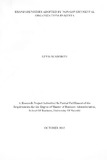| dc.description.abstract | Increasing competition, dwindling donor resources and the rise in public accountability in the nonprofit sector has called for Non Governmental Organizations (NGOs) to consider commercial branding concepts. The objectives of this study were to assess the extent to which NGOs in Kenya have embraced the brand concept, to establish the brand identities adopted by these NGOs and finally, to identify the role of these brand identities in the organizations. The research design was descriptive in nature, and an experience survey was used. The population of the study was 6,075 registered NGOs in Kenya and a sample of 30 NGOs was selected for the study. The study achieved a response rate of 30% with 9 NGOs participating in the research. The NGOs were both local and international from diverse sectors. The data collected was both primary and secondary with the primary data collected through interviews using an interview guide as a tool. The key informants of the NGOs interviewed included 6 communications officers, 2 program officers and 1 executive director. The data collected was the analyzed through content analysis. The findings of the study revealed the following: that the brand concept among NGOs in Kenya was new and growing, with only the larger international NGOs embracing the concept while the local NGOs lagged behind. The findings also showed that the brand identities adopted by the NGOs were brand-as-organization with the approach and methods of the NGO giving it its uniqueness, the brand-as-symbol with NGOs having several meaningful and identifiable symbols and brand-as-cause, which was found to be the main identifier. The brand personalities of the NGOs were unique to the different contexts but not key identifiers. The brand identities played dual roles, although the external role of visibility, fundraising and trust were found to be more important.
The study concluded that the brand concept is a growing area in the NGOs in Kenya and needs to be a proactive strategic tool in managing the existing organizations equity, enhance mission and sustainable results of the organization. The study recommends development of organizational branding guidelines, impact-driven culture and branded campaigns. Further research should be done in the areas of managing the nonprofit brand across multiple publics as well as return on investment of nonprofit branding. | en |

